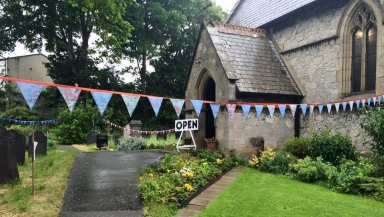
Some people may never return to church if their own church closes its doors, a new poll has found.
The survey of 2,667 UK Christians by National Churches Trust found that in-person church attendance may fall by over a quarter (29%) when a local church closes.
Over a fifth (22%) of churchgoers currently attending in-person services said they would be unwilling or unable to attend a different church if their church were to close. This rose to nearly a third among churchgoers in the North East (30%) and North West (31%) of England.
Another 7% said they would worship online only if their church closed, while the same proportion said that they would attend a different church but less often than currently.
Older people aged 65 and over were most likely to drift away, with only a fifth of this age group (19%) saying they would find a new church to attend as often as they do currently. Even among 18 to 24 year olds, only a quarter (28%) said they would find a new church.
Eddie Tulasiewicz, Head of Policy and Public Affairs at the National Churches Trust said: "The dramatic impact of church closures is made clear in our opinion poll; it cuts the number of people going to church by a third. Older people, many of whom live alone and for whom attending church helps combats loneliness, are the most likely to be negatively affected by the closure or their local church.
"Keeping local churches open allows local people to worship in a building they know and love. It also keeps local heritage alive for future generations and means that local people can continue to benefit from support services, such as foodbanks, warm spaces and youth clubs and access cultural activities such as concerts and exhibitions.
"Last year, the National Churches Trust was able to help over 250 urgent church building and repair projects with funding of almost £2 million, in the process keeping churches open and safeguarding over 72,000 years of history. Church repairs help create jobs and develop specialist skills of value to the wider construction and heritage sectors."
The Rev Alisdair Laird is Area Dean and vicar to the twenty rural parishes of South Holderness deanery in East Yorkshire.
He said: "Once a church building is closed, especially in villages and county towns, in many ways the thing that represents the historic heart of that place has been abandoned, for everyone, not just those who share a Christian faith."
He is all too familiar with the impact of church closures. Last year, All Saints Church in Burstwick, a Grade 1 listed church in his area, had to close and many worshippers "felt a deep sadness at the loss of their local historic church".
"When the pub, the shop, the school, and finally the church are all gone what is actually left? What does it say about ourselves as human beings, our values and our willingness to be responsible members of a lively society?" he said.
"Traditionally people, not surprisingly, tend to be very focussed on 'their church', especially in villages, and are reluctant to be involved beyond that. The good news is that we are finding that people here are making more effort to 'go down the road' to a neighbouring church, even more so where people provide lifts for those who don't drive.
"Helping people to worship at a new church does of course mean that they need to feel welcomed by clergy and other worshippers, but it does represent an opportunity for community and growth.
"Our parish churches are a huge and glorious treasury of shared history, celebrations, creativity and hopes. Regardless of faith and beliefs we have a shared responsibility to our ancestors, our descendants, and to each other to recognise that treasure and to play our part in caring for it and helping as many churches as possible stay open."
The UK has seen a dramatic decline in the number of active churches, with over 3,500 shuttering for good in the last decade.
North of the border, the Church of Scotland is selling off around 40 per cent of its churches due to declining membership and financial pressures.
The National Churches Trust said that the pace of church closures across the UK was accelerating, and that many church buildings are under threat because of the increasing cost of repairs and maintenance.
In England, over 900 churches are on the Historic England Heritage At Risk Register, and in Wales around a quarter of historic churches and chapels have closed in recent years, with a similar number at risk.
The National Churches Trust is appealing to the government to help struggling at-risk churches by extending the Listed Places of Worship Grants Scheme beyond March 2025, when it is due to end. The scheme allows churches to claim back VAT on repairs, significantly reducing costs.
Claire Walker, chief executive of the National Churches Trust, said: "Many church closures take place as the money cannot be found to carry out urgent repairs. Fixing a roof can cost over half a million pounds.
"The backlog of repairs for the Church of England's churches alone is at least £1 billion, and the annual need is estimated to be £150 million a year.
"Some churches are currently helped by the Listed Places of Worship Grants Scheme, which allows historic churches to claim back the VAT on repairs. But this scheme is due to expire in March 2025.
"We therefore urge the new Government to extend this scheme, first introduced by Gordon Brown in 2002, in the forthcoming Budget. This will allow those running churches to plan for the future safe in the knowledge that they will be able to claim back 20% of their costs."













